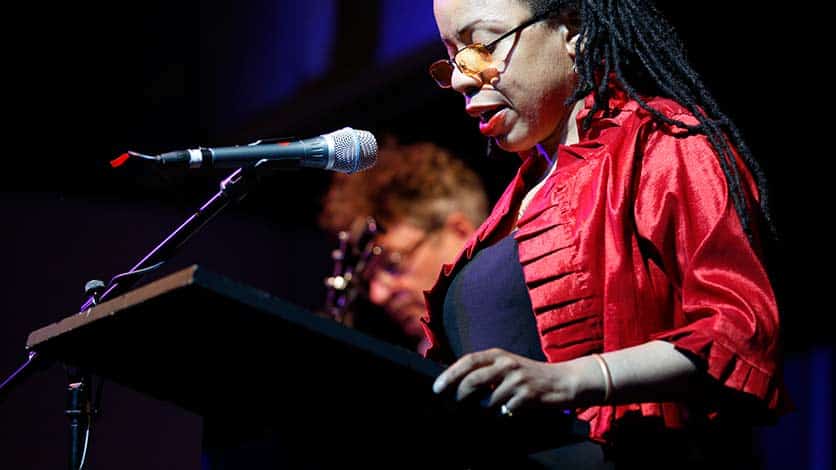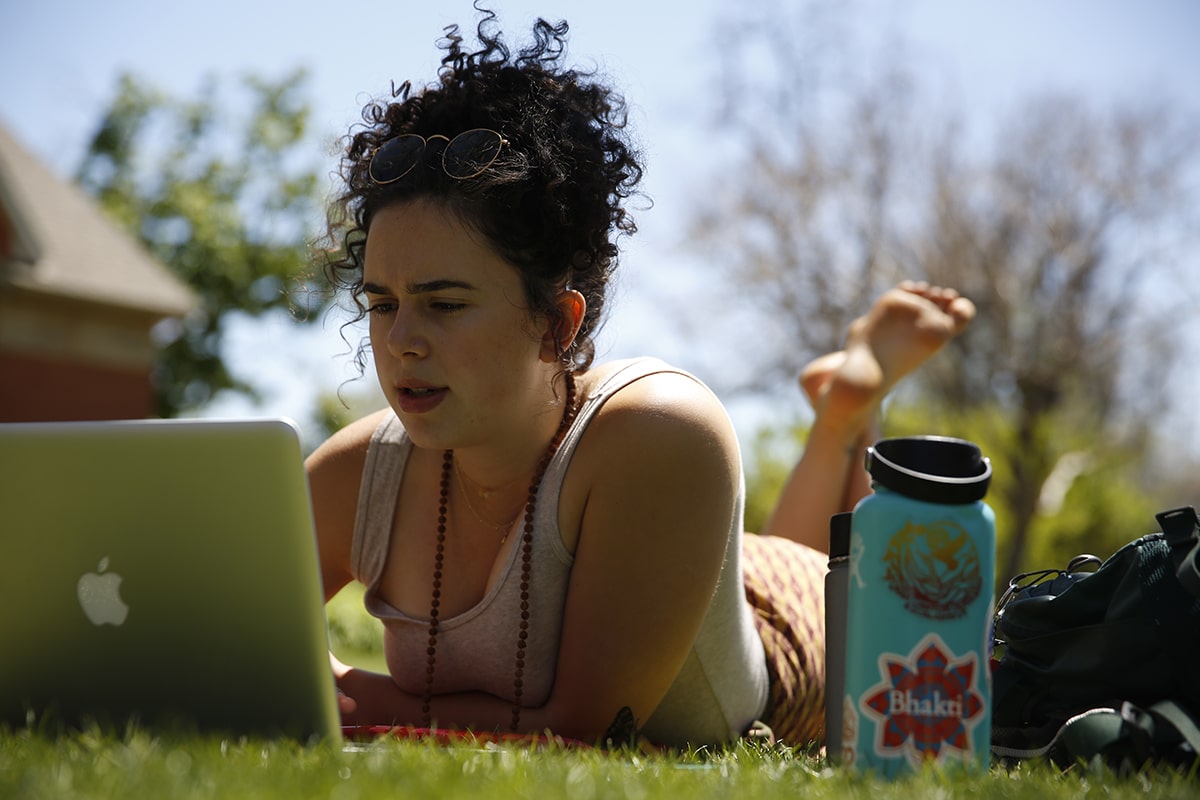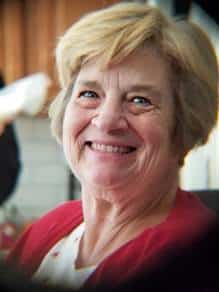MFA in Creative Writing & Poetics
Master of Fine Arts in Creative Writing and Poetics
Join a thriving community of writers and artists working across genres and forms with our open-genre program. Discover our MFA in Creative Writing.
Program Overview
Naropa’s MFA in Creative Writing and Poetics provides the only open-genre degree in the country. Rooted in the lineage of experimental poetics, writers at the Jack Kerouac School work across artistic disciplines and genres to hone their voices on and off the page.
From contemplative to documentary poetics, MFA writers at Naropa work at the cutting edge of contemporary, experimental forms alongside the traditions of letterpress printing, book arts, and small press publishing.
Founded in 1974 by Allen Ginsberg, Anne Waldman, and Diane di Prima, the Jack Kerouac School of Disembodied Poetics values the craft and spirit of writing. Its MFA in creative writing program culminates in a critical and creative thesis, enabling writers to enter the world ready to take their work to the next level from academia to publishing, performance, and community building.
Renowned Faculty
Our faculty includes accomplished poets and writers from around the country and the world, including program director Anne Waldman, distinguished professor and world-renowned poet and performer. To date, Naropa’s graduate creative writing program students have studied with Joy Harjo, Roberto Tejada, Layli Long Soldier, Diana Khoi Nguyen, Tongo Eisen-Martin, and other visiting faculty. Encounters with these gifted writers and performers are a hallmark of Naropa’s Jack Kerouac School.
Cross-Genre Curriculum
The graduate program’s approach explores revolutionary genre-bending in the craft of writing, and our inclusion of poetics, unique among MFAs in creative writing, encourages exploration across genres and themes. Naropa’s cross-genre curriculum helps writers shape their own aesthetic and develop their unique critical and creative voices. We challenge the notion of safe or generic works and create a space for radical exploration and experimentation.
Writing Community
At Naropa, community is fostered through a culture of collaboration over competition. Our greatest concerns are not program rankings or how often and where student work is being published. Instead, we are concerned with writers discovering the full expression of their creative capacity. Our writing community is strengthened by a rich calendar of events, including our Summer Writing Program, an annual convocation of students, poets, fiction writers, performers, letterpress printers, and more.
Quick Facts
- Open-genre curriculum
- On-campus degree
- Unique experimental approach
- Participation in the Summer Writing Program
- Guidance in preparing the creative thesis for publication
- Cohort model developing a strong sense of community among MFA students
- Several scholarship and financial aid opportunities
- Applications open for August 2025
- Deadline for guaranteed fellowship consideration: February 1, 2025.
Program Format
The MFA in Creative Writing and Poetics is a two-year, on-campus, 48-credit graduate degree. Students typically enroll in 9 credit hours per semester and 12 credit hours in the Summer Writing Program (over two summers).
The program offers an open-genre curriculum within a contemplative academic environment, providing MFA students maximum flexibility within the degree. Graduate students are encouraged to take classes across genres, enabling them to investigate a personal, intensely original writing process and style.

Course Spotlight
Multigenre Workshop: Text and Image
Degree
Requirements
MFA in Creative Writing & Poetics Requirements
9 credits of writing workshops
Semester-long courses in creative writing workshops require regular submission of original work for critique, oral presentation, and editing. Creative reading and writing courses have distinct literature and creative writing components.
- WRI-614 Prose Workshop: Memoir/Anti-Memoir(3)
- WRI-625 Multigenre Workshop: Adaptation(3)
- WRI-629 Multigenre Workshop: Translation(3)
- WRI-671 Prose Workshop: Narrative Practices(3)
- WRI-715 Poetry Workshop: Experimental Poetry(3)
- WRI-720 Prose Workshop: Experimental Prose(3)
- WRI-722 Poetry Workshop: Eco-Poetics(3)
- WRI-729 Multigenre Workshop: Collaborative Texts(3)
- WRI-730 Multigenre Workshop: Performance Art and Writing(3)
- TWRI-731 Prose Workshop: the Novel(3)
- WRI-739 Poetry Workshop: Contemplative Poetics(3)
- WRI-744 Multigenre Workshop: Somatic Writing(3)
- WRI-748 Multigenre Workshop: Activist Writing(3)
- WRI-749 Multigenre Workshop: Text and Image(3)
- WRI-758 Poetry Workshop: Documentary Poetics(3)
- WRI-763 Multigenre Workshop: Notes on Architecture(3)
- WRI-770 Multigenre Workshop: Cross-Genre Forms(3)
- WRI-775 Multigenre Workshop: Cross-Disciplinary Writing(3)
- WRI-793 Special Topics: Writing Workshop(3)
9 credits of poetics seminars
These examine a single writer’s work or specific topics in literary history, or encompass a survey of historical or theoretical orientations, and require critical papers in a standard academic format. Students must take WRI-617 in their first semester.
- WRI-617 Poetics Seminar: Writers in Community(3)
- WRI-640 Poetics Seminar: Women Writers(3)
- WRI-656 Poetics Seminar: The Archive(3)
- WRI-677 Poetics Seminar: Critical Theory(3)
- WRI-707 Poetics Seminar: Major Authors(3)
- WRI-727 Poetics Seminar: Cross-Cultural Literature(3)
- WRI-733 Poetics Seminar: Queer Lit(3)
- WRI-740 Poetics Seminar: Film Poetics(3)
- WRI-757 Poetics Seminar: Lineages(3)
- WRI-761 Poetics Seminar: Contemporary Trends(3)
- WRI-796 Special Topics: Poetics Seminar(3)
12 credits of the Summer Writing Program (workshops, lectures, readings)
- WRI-652 Week Two Summer Writing Program(2)
- WRI-651 Summer Writing Program(2)
- WRI-653 Summer Writing Program I(2)
- WRI-751 Summer Writing Program(2)
- WRI-752 Week Two Summer Writing Program(2)
- WRI-753 Summer Writing Program(2)
3 credits of contemplative practice
There are a variety of courses available that satisfy this requirement, including, but not limited to, Taijiquan, sitting meditation, aikido, ikebana, sumi brushstroke, thangka painting, and yoga. Each of these disciplines provides training in an art form that cultivates mindful awareness.
The Creative Writing and Poetics program offers the following 3-credit contemplative courses:
- WRI-739 Poetry Workshop: Contemplative Poetics(3)
- WRI-744 Multigenre Workshop: Somatic Writing(3)
3 credits of professional development (teaching or publishing)
There are a variety of courses available that provide professional development in teaching and publishing.
- WRI-602 Professional Development: Letterpress: Well-Dressed Word(3)
- WRI-603 Professional Development: Letterpress: First Impressions(3)
- WRI-607W Professional Development: Teaching Practicum: Designing a Writing Workshop(2)
- WRI-672 Professional Development: Book Arts(3)
- WRI-700 Professional Development: Writing Pedagogy Seminar(3)
- WRI-705 Professional Development: Small Press Publishing(3)
- WRI-781 Professional Development: Project Outreach(3)
- WRI-797 Special Topics: Professional Development(3)
6 credits of electives (workshops, interdisciplinary courses, etc.)
Students have ample choices to fulfill the 6-credit elective requirement and may choose courses from a wide range of offerings (including taking extra poetics and workshop courses). The Creative Writing and Poetics program also offers the following electives:
- WRI-789W Fall Writers Practicum(1)
- WRI-791W Spring Writers Practicum(1)
- WRI-794W Writers Practicum With Anne Waldman(1)
- WRI-795W Writing Practicum with Allen Ginsberg Visiting Fellow(1)
6 credits of thesis (faculty mentorship on book-length creative manuscript and critical research poetics essay)
In their last semester, MFA students submit an MFA thesis, which includes creative and critical components. Additional information about the MFA thesis and extended thesis is available in the JKS office.
- WRI-875 MFA Critical Thesis Seminar(3)
- WRI-880 MFA Creative Thesis(3)
- WRI-881 Extended MFA Thesis(0.5)
Why Choose Naropa?
Strong Writing Tradition
The Jack Kerouac School of Disembodied Poetics has encouraged experimental forms across genres since its founding in 1974 by Allen Ginsberg, Anne Waldman, and Diane di Prima. We challenge the notion of safe or generic works and create a space for radical exploration and experimentation.
Contemplative Approach
Naropa students deepen their writing craft not only through external exploration but by exploring their minds, hearts, and souls. Introspective pedagogy leads to better writing and a greater connection with yourself and your writing community.
In-house Publishing & Printing
At Naropa, you will have the opportunity to Publish your work in the student-run literary journal of the Kerouac School , Bombay Gin, which is distributed nationally through Small Press Distribution. Students and alumni have also started their own presses with support from the university.

How this Program Prepares You
Professional Dossier
Naropa students graduate with a solid record of written work, developed alongside peers and polished under the guidance of expert faculty. Our workshops, seminars, and summer programs are designed to push students to discover and harness their own writing voice.
Critical Analysis
Our program actively encourages students to approach reading and writing through a critical lens, questioning assumptions, identifying bias, and deconstructing generalizations. Graduates from the MFA in Creative Writing and Poetics are trained to recognize intersectionality in the literary arts, recognizing the wider spectrum that surrounds any piece.
Writing as Creative Art
Our program guides students through the process of crafting creative work, encouraging cross-genre exploration to enrich their practice and develop their writing skills. Students are encouraged to follow and develop their artistic instincts to the fullest, realizing their potential as artists and writers.
What You'll Learn
Superior Writing Craft
Strengthen your craft and technique in a variety of literary genres.
Foundation in Critical Theory
Clearly communicate original ideas on a variety of literary texts and topics.
Awareness of Intersectionality in the Literary Arts
Recognize and appreciate intersecting social identities in literature.
Freedom of Expression
Discover your full potential as a writer by learning to take creative risks.
Career Preparedness
Become a published author, writing teacher, translator, or editor.
Career Opportunities with a MFA in Creative Writing & Poetics
Our graduate creative writing program graduates go on to publish across literary fields, start small presses, pursue PhDs, and careers as professors, publishers, podcasters, artistic rebels, and more.
- Lyricist: write words for songs, matching melody and rhyme.
- Poet: use language to creatively express emotion, ideas and experiences.
- Proofreader: check written work for errors and inconsistencies.
- English Teacher: teach at the postsecondary level.
- Author: craft and publish original material.
- Editor: review and improve written work for publication.
Hear from a Graduate
I knew Naropa was the right choice because of my dual values of deepening my roots in practice while growing out the limbs of my creative writing capacity and study. I also knew that this university and community would provide the perfect container for me to fulfill the purpose I feel is mine in the world.
FAQS about the
MFA in Creative Writing and Poetics
What can you do with an MFA in creative writing?
Why get an MFA in creative writing?
How long does a creative writing MFA take to complete?
The MFA in Creative Writing and Poetics is a two-year, 48-credit graduate degree. As this is an on-campus degree, students must relocate to Boulder, Colorado, in order to attend. Alternatively, our low-residency MFA in creative writing can also be completed in two years and does not require relocation.
What sets Naropa’s Creative Writing MFA apart from other programs?
What types of funding are available?
Funding includes the Allen Ginsberg, Anne Waldman, and Anselm Hollo Graduate Fellowships.
The fellowships are awarded annually to three incoming MFA Creative Writing and Poetics students (residency program). Allen Ginsberg, Anne Waldman, and Anselm Hollo fellowship recipients will receive full funding (tuition and fees), plus an additional $5,000 scholarship as well as a $4,500 stipend. Fellowship recipients may not simultaneously hold a Graduate Assistantship.
Additionally, partial funding is provided for students who have applied for and been offered graduate assistantships with the Naropa Writing Center.
Visit our Graduate Scholarship page to read more about funding, fellowships and scholarships for the Creative Writing & Poetics MFA and other degrees.
Learn More About the Program

Connect
with your counselor
Geri Anderson
Admissions Counselor
- (970) 725-6352
- geri.anderson@naropa.edu
- Schedule Appointment
Ready to Apply?
Admission Requirements
Naropa’s application process evaluates both academic performance and candidates’ openness and willingness to engage in contemplation.
Learn more about admission requirements and the application process for our Creative Writing MFA.
Graduate Students
Completion of an undergraduate degree is required in order to apply for our MFA in Creative Writing. Candidates must submit a transcript of their undergraduate coursework, a statement of interest, a resume, two letters of interest, and a creative writing sample. They may also apply for financial aid at this stage.
Applicants who meet qualifying criteria will be invited to an interview day, which includes group and individual interview.
International Students
You can apply to Naropa as an international student with an undergraduate diploma from a non-US university. However, additional documentation must be submitted together with your application. Learn how to apply to Naropa as an international student.
Costs and Financial Aid
Naropa graduate students can apply for many grants, scholarships and financial aid opportunities. Over 75% of our graduate students receive federal or institutional support to finance their studies.
See our Costs & Aids page to learn more about the costs of attending Naropa, well as grants, scholarships, and programs you may be eligible for.
Graduate Scholarship Opportunities




